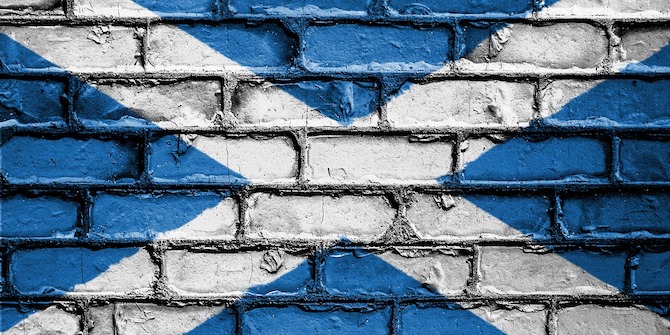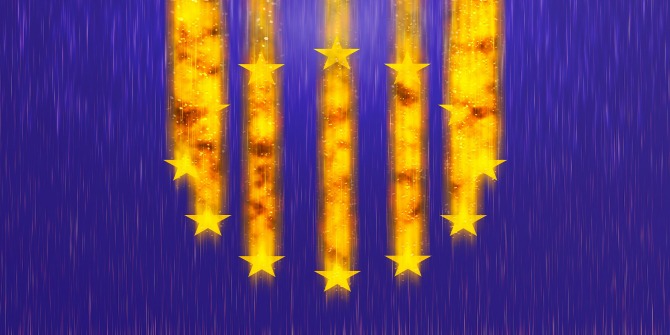

 Zachary Greene, Jae-Jae Spoon and Christopher Williams argue that some proponents of Scottish independence may have resorted to tactical voting in the EU referendum. They did so in the hope that a Leave win would make a second Independence referendum more likely, responding to hints by SNP leaders to this effect.
Zachary Greene, Jae-Jae Spoon and Christopher Williams argue that some proponents of Scottish independence may have resorted to tactical voting in the EU referendum. They did so in the hope that a Leave win would make a second Independence referendum more likely, responding to hints by SNP leaders to this effect.
Proponents of direct democracy and referendums often point to their apparent simplicity for voters: a direct vote would allow citizens to provide a simple yes or no answer to pressing troubles. Yet, elite-led referendums’ apparent simplicity likely masks a more complex underlying process. An increase in the number of referendums across representative democracies opens the door for the tactical use of votes in one referendum, to set the stage for another.
In our forthcoming article, we argue that this is just the case for Scottish voters in the 2016 Brexit referendum. Elite statements from prominent Scottish nationalists planted the seed among voters that a vote in favour of Brexit could be instrumental in securing a second Scottish independence referendum. Using panel data from the British Election Study (BES), we examined whether Scots who supported Scottish independence were more likely to vote Leave, and how party identification conditions the likelihood of a pro-independence Scot voting Leave.
 Image credit: CC0 Public Domain.
Image credit: CC0 Public Domain.
During the Brexit campaign, the official message of all Scottish parties was in support of Remain. However, many elites in Scotland sent mixed messages to voters, including former Scottish First Minister Alex Salmond, and former SNP leader Gordon Wilson, who both suggested that a vote to ‘Leave’ the EU could result in a second independence referendum. Even current SNP leader and Scottish First Minister Nicola Sturgeon, who officially supported Remain, stated in a debate that a Leave vote could be the material change that leads to a second Scottish referendum.
Following the logic of tactical or strategic voting, we argue that these mixed signals from Scottish elites encouraged Scots who supported independence from the United Kingdom to vote Leave in the EU referendum, in the hopes of securing a second independence referendum. That is to say, Scots who wanted a second bite at the apple of independence would vote in favour of the UK leaving the EU, thinking that it may change the circumstances enough to inspire a second Scottish independence referendum.
Further, many of the mixed messages regarding the Brexit vote and the possibility that it would lead to a second Scottish independence referendum were coming from elites in the SNP. Following the logic that individuals are more likely to listen to messages from parties they support, we expect that the mixed messages regarding Brexit were more likely to influence supporters of the SNP. Simply put, we propose that the messages regarding the likelihood of a second Scottish independence referendum as a result of a vote to ‘Leave’ were more likely to influence voters who were both supports of the SNP and of Scottish independence.
Relying on panel data from Waves 3 (September 2014) and 8 (June 2016) of the BES, we were able to examine how individuals who reported voting in favour of Scottish independence after the September 2014 referendum, planned on voting in the June 2016 Brexit referendum. Contrary to our first expectation, those who voted in favour of Scottish independence were less likely to report an intention to vote Leave in the Brexit referendum.
In fact, the predicted likelihood of voting Leave if a person voted against Scottish independence was 0.25. At the same time, an individual who voted for Scottish independence had a predicted likelihood of voting Leave of about 0.21 (see Figure 1). Thus, it appeared that those who supported Scottish independence were actually more in favour, albeit very slightly, of remaining in the EU than those who opposed Scottish independence.
Figure 1. Likelihood of Voting in Favour of Brexit by Vote in the 2014 Scottish Independence Referendum
 Note: table compiled by the authors and derived from their journal article (2017).
Note: table compiled by the authors and derived from their journal article (2017).
Conversely, our second expectation, that those who support Scottish independence and the SNP would be more likely to vote Leave, was confirmed. Supporters of the SNP who voted against Scottish independence had a predicted likelihood of voting to ‘Leave’ the EU of about 0.07. However, SNP supporters who voted for Scottish independence had a predicted likelihood of voting Leave of about 0.21 (see Figure 2). This suggests that SNP supporters who also sought Scottish independence picked up on the mixed messages of elites, and voted strategically.
Figure 2. Likelihood of Voting in Favour of Brexit by Vote in the 2014 Scottish Independence Referendum for Supporters of the SNP
Note: table compiled by the authors and derived from their journal article (2017).
Importantly, this study has implications for our understanding of voting behaviour, political parties, and referendums, as well as for understanding the outcome of the Brexit vote. First, these results indicate tactical or strategic voting does occur when voters are presented with uncertain long-term incentives. In this case, Scottish voters who support the SNP and supported Scottish independence were willing to risk leaving the European Union in the hope of achieving the goal of Scottish independence. Second, our research indicates that parties are not unitary actors, and that the public can perceive and react to intra-party divisions. Third, our findings strongly suggest that the outcomes of referendums are not necessarily clear plebiscites regarding a single issue, which occur in a vacuum.
Perhaps most importantly, our research demonstrates that the Brexit referendum may have underpredicted support for remaining in the EU among Scots. Our findings suggest that if tactical voting among supporters of the SNP and Scottish independence did not occur, the outcome of the Brexit referendum might have looked very different.
______
Note: this post summarises the findings of the authors’ joint article “Reading between the lines: party cues and SNP support for Scottish independence and Brexit” in the Journal of Elections, Public Opinion and Parties, 2017.
 Zachary Greene is Chancellor’s Fellow at the University of Strathclyde. Before moving to Scotland, he worked as a post-doctoral researcher on the C2 project as a part of the SFB 884 “Political Economy of Reforms” research centre at the University of Mannheim.
Zachary Greene is Chancellor’s Fellow at the University of Strathclyde. Before moving to Scotland, he worked as a post-doctoral researcher on the C2 project as a part of the SFB 884 “Political Economy of Reforms” research centre at the University of Mannheim.
 Jae-Jae Spoon is Associate Professor of Political Science and Director of the European Studies Center at the University of Pittsburgh. Her research focuses on comparative electoral behaviour, primarily in Europe.
Jae-Jae Spoon is Associate Professor of Political Science and Director of the European Studies Center at the University of Pittsburgh. Her research focuses on comparative electoral behaviour, primarily in Europe.
 Christopher J. Williams is Assistant Professor of Political Science and International Studies at the School of Public Affairs, University of Arkansas at Little Rock. He has previously held positions as a postdoctoral researcher at the University of Mannheim, the European University Institute in Florence, and at Maastricht University.
Christopher J. Williams is Assistant Professor of Political Science and International Studies at the School of Public Affairs, University of Arkansas at Little Rock. He has previously held positions as a postdoctoral researcher at the University of Mannheim, the European University Institute in Florence, and at Maastricht University.
All articles posted on this blog give the views of the author(s), and not the position of LSE British Politics and Policy, nor of the London School of Economics and Political Science.









The SNP website 19-06-16 ‘If you are voting with Independence in mind this Thursday vote Remain’ signed N. Sturgeon. I have a screen cap.
The ‘may might and could’a’been’ conclusion based on the numerically impossible from BES waves of 33000 cohorts.
Propa- ‘I cant believe its not research’!
Cancel Brexit then?
Even if 50% of Scotland’s 38% vote to leave the EU had voted remain we’d still be leaving the EU. it isn’t credible to suggest that we’d have a vote to remain in the EU of over 81% given the votes in other regions.
The hope for Scottish independence supporters was that Scotland voted remain while the majority of the rest of the UK voted leave, and this is exactly what happened.
Within an independent Scotland I would vote leave EU in most situations. However, as Scotland is within the UK I held my nose and voted remain in EU Ref.
It has been the perfect outcome to throw around the idea of a second Scottish independence ref.
Being outside the EU would be silly for a small state like Scotland, building FTA’s and trade relationships with the rest of the world takes a long time, and we wouldn’t have much bargaining potential or experience, yes the EU has some flaws so why not choose the same deal as Norway, another country rich in oil and fish, this gives you all the trade deals and access to the single market, but you retain control of fishing, farming and home affairs among other things, being in the EEA and EFTA would ideally suit Scotland. I don’t remember the exact numbers but I read that typically an EU state ratifies about 20,000 eu directives in a year vs 5000 for a country in EFTA/EEA this is no problem to me as the EU is a huge market for Scotland. the tories and labour don’t seem to want this deal for the whole of the UK, as it includes the four freedoms one of them being freedom of movement, the argument against this form of membership is you have no voice in the EU, but that isn’t the whole picture, the EFTA group actually help to shape a lot of the policies that come through, and we’d be a big member.
I’ve not yet had chance to read the full article linked to above, so don’t know whether the issue I am about to raise is dealt with in that more in depth piece. However, going by the content above, to my reading the authors seem to be making the assumption that every vote for Brexit by a supporter of the SNP was a tactical one aimed at making a second independence referendum more likely. But surely there are a significant number of SNP voters (what we might call old fashioned nationalists) that are no more keen on Scotland being in the EU than they are on it being in the UK. Their vote can’t credibly be characterised as wholly tactical. Yes, they want a second independence referendum, but they’d also quite like to see Scotland leave the EU.
Mark Harper
You just posted two complete untruths. If everyone that voted in Scotland had voted Remain: Remain would have won. Leave would have gotten 16,392,420 votes and Remain would have gotten 17,159,563. You claim that Scottish votes made no difference but the way I see it, Scottish votes made ALL the difference. You act like Brexit was entirely England’s fault but in reality, Scotland massively helped Brexit happen and it’s about time you all stop blaming others and take responsibility for the events you helped cause, seemingly in an attempt to further your own independence agenda even though Brexit affects all of us and not just Scotland. How selfish of you all.
Second of all, there were no Scottish voters in the EU referendum or English voters. We voted as British voters about an issue affecting the entire country, not as Scottish/English voters voting on a regional issue. The fact that so many people still falsely claim there was a separate Scottish electorate for the EU referendum absolutely astounds me. One country, one people, that’s how it works.
You can’t on the one hand say we caused brexit and on the other say there’s no such thing as scotland in the brexit referendum, the United Kingdom is made up of four countries this fact to many commentators, is either of great importance or irrelevant depending on the point they are trying to make, starting to wear a bit thin.
Also 1 million Scottish voters voted leave, it is madness to suggest they would all have voted to stay in the EU if they hadn’t had mixed messages, the vote here was never going to be 100% remain, the fishing community and other groups voted leave due to tory lies.
Referenda are not enough. People everywhere need ballot initiatives so they can set the agenda, instead of just voting yes or no on an occasional item offered by politicians. Colorado is a relative Paradise because of ballot initiatives, with the legislature doing almost nothing except impeding citizen democracy: https://spryeye.blogspot.com/2012/01/case-for-ballot-initiatives-and.html
If everyone who voted in Scotland had voted Remain it still would have made no difference at all to the result.
Well, Scotland had 1m leave voters, the leave remain vote was split 16m / 17m would have flipped the result.
Just it isn’t really feasible that among the 1m leave voters who are SNP indy supporters, lets say 50% are, we’d still be leaving the EU.
Scotland voted overwhelmingly to remain in the EU. England voted to leave thereby dragging Scotland out of the EU against the will of the majority of Scottish voters. All this does is highlight how undemocratic the UK is regarding the interests of the Scottish voters
Two points. Firstly Wales voted leave, not just England. Secondly when the people of Scotland voted to remain part of the UK they voted to maintain a situation where they can be outvoted within the UK. That’s part of the deal that the Scottish people freely chose to continue to be signed up to. There is nothing undemocratic about that.
We didn’t vote no for the soul purpose of being outvoted, many voted no because they were worried about EU membership, ship building and jobs etc.
I don’t remember any campaign material saying “Vote no to ensure you continue to be outvoted within the UK”
But I do remember a vow that was claimed to give us as close to federalism as humanly possible, essentially this was banded about as, as close to indy while staying in the UK as you can get, “the best of both worlds”